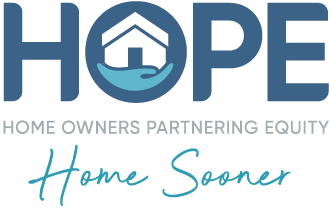Download the Investor Information Pack

The co-investor that enables essential workers to own a home close to work
Investing in property and people
HOPE can show you how
Why invest in HOPE
Receive strong returns from a socially responsible investment, together with the diversification benefits of investing in residential property
Delivering a social dividend estimated in excess of 30 cents for every $1 invested
A new kind of ownership partnership
We co-invest with essential workers in their property, significantly reducing the cost of funding for them. Together we share the investment and the profits. It creates affordability for them and profitability for all of us. While HOPE is a not-for-profit enterprise, it’s important that all our partners and investors benefit.
WATCH THE BELOW VIDEO TO FIND OUT MORE
An attractive opportunity in residential property, targeting returns of 10% per annum net of fees and expenses, before tax #
Delivering a social dividend estimated in excess of 30 cents for every $1* invested through:
- Reduced commute and time away from family helps to enhance physical and mental wellbeing
- Improvements to workplace productivity can reduce employee churn
- Cost of living savings
- Puts our most essential workers on the home ownership ladder
THE FINE PRINT
#Target returns only. Investment returns are subject to risk and are based on assumptions. Actual returns may differ and are not guaranteed. Investments will be available to wholesale investors only on terms to be described (including risks) in a private placement memorandum available on request from HOPE.
* Refer HOPE Housing Benefit and Costs Forecast - UNSW Centre for Social Impact, May 2021 The Problem – Affordability
Our Investor Partners
Our partners include Super Funds, Family Office Investors and philanthropic ventures. HOPE investors are looking to make a meaningful impact and achieve a measurable social return. Investment in HOPE provides a real asset-backed portfolio with strong commercial returns.
Learn more about HOPE's social impact
We partner with the Centre for Social Impact at UNSW to measure and report on the social impact of HOPE’s home ownership solution for Essential Workers and our communities.
Frequently Asked Questions
Aside from the capital gains on the sale, how will investors make money?
Capital gains are realised by investors when one of two events occur:
- Sale of the property; or
- When the homeowner buys out part or all of the HOPE share. In this case the price they pay for a greater equity stake will be determined by the current market price of the property.
What are the returns projected to be and given your non-profit status how will returns be distributed?
We are targeting 10 per cent per annum (net of management fees and other fund expenses, before tax). The HOPE corporate entity is not for profit meaning that management fees will be charged on a cost recovery basis. The Fund itself will realise a competitive and commercial return to investors distributed on a quarterly basis.
How is HOPE funded?
Funded by private philanthropic investment, HOPE is a Not for Profit entity, unregistered managed investment scheme. HOPE Fund I is now open to investors, the minimum capital investment is $1 million. The target fund size is $400 million.
What properties will be eligible: strata units, freehold dwellings, new builds, old builds?
HOPE will provide capital for all types of housing except for off the plan developments.
Does the Homeowner pick up expenses like rates, utilities, strata fees and property insurances?
The homeowner and HOPE are not tenants in common. The homeowner is on title as sole owner of the property. As owner of the property they are responsible for all the normal outgoings: rates, utilities, strata fees and property insurances.
Is this solving anything or merely a nice sounding idea with little real-world application or merit?
The Centre for Social Impact at UNSW has helped us to develop a system to measure the social impact our new housing solution will have on individuals, employers and our communities. Enabling essential workers to live close to their place of work reduces travel time and improves work/life balance and physical and mental health. This in turn increases work productivity and decreases absenteeism. It’s all about strengthening our communities.
